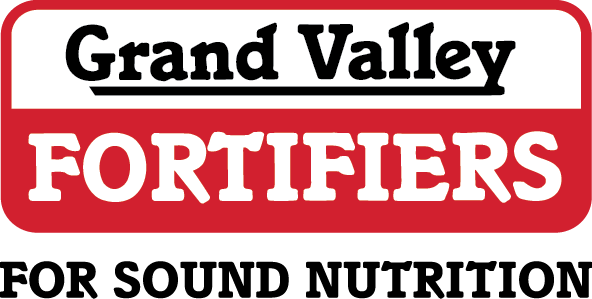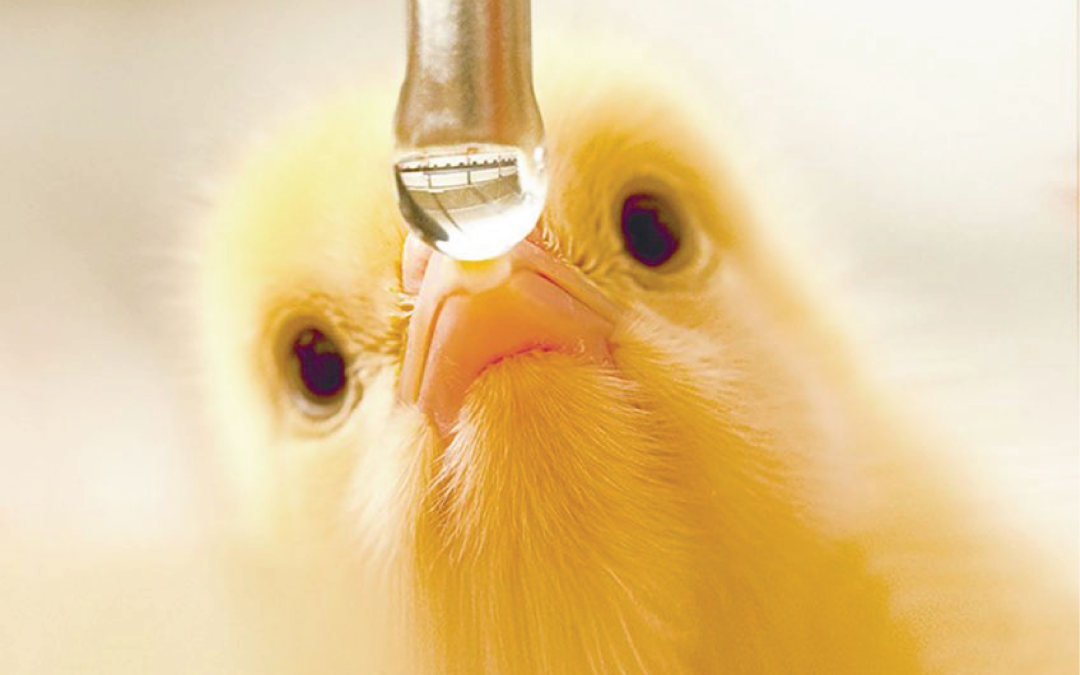By Bram Evers
Poultry Specialist in Monogastric Sales,
Grand Valley Fortifiers
Water is often regarded as the most important nutrient and yet most likely the cheapest and often forgotten. Clean water is a critical component of livestock farming as it directly affects animal health, productivity and overall well-being. Birds drink approximately up to 1.8 times more water than they do feed (for every 100 grams they eat, they drink around 180 mL of water). As livestock business consultants, we closely monitor water and feed intake on the farms we work with. We often see that a lower feed intake is the result of a lower water intake which may have occurred a few days prior. In other words, a bird is probably eating less because it is drinking less. On a more practical level, lines that are contaminated with bio film can cause the drinking nipples to leak. This may be due to small particles of bio film, clogging up the nipple system. Farmers must ensure that their animals have access to clean and uncontaminated water sources to maintain a successful and sustainable livestock operation.
Did you know that through the drinking nipples, bacteria can move up into your waterlines? So even if you work with a clean water source (for example city water) you should scope your waterlines regularly. Book a free water consultation with us and we are happy to come out! We will bring an endoscope (water camera) to look at the inside of your waterlines.

Do you want to test this yourself?
What you will need:
- White bucket
- Transparent water can
Water can be assessed with our own senses. For example, judge the flushwater that comes out from the drinking water lines. It’s a quick and easy way to get a good idea of what the inside of the drinking water system looks like.
This test is based on 4 criteria:
- Sediment: do you see floating particles in water?
- Clarity: can you see through the water or is it cloudy?
- Colour: Is the water visually discoloured?
- Smell/taste: Is there a smell or taste in the water?

Was the water up to your expectations? In other words- would you drink it? If the answer is no, we have some solutions for you!
Cleaning Programs
- Continuous cleaning: With continuous cleaning, our product is added to the drinking water during the cycle. Because animals must drink the product, lower concentrations are used compared to cleaning the waterlines in between cycles. When working with lower concentrations, a product with a high oxidation capacity is preferred (such as chlorine-dioxide). This means that the product is active from the front to the rear of your waterlines, even with low doses. Advantages of continuous cleaning:
- Animals are present in the barn
- Low dosage
- Di-O-Clean doesn’t affect taste or smell of the water
- No labor required, lines become cleaner over time while animals are drinking
- Periodic (shock) cleaning: Is a compromise of cleaning in between cycles and continuous cleaning. Lower concentrations are still used so that your animals can drink the water. Instead of using a product continuously, a product is only dosed during certain intervals. For example, this can be once a week, once a month, or the last week of a cycle.
When we know we are working with clean water and waterlines (the whole water infrastructure), we can provide nutritional care through the water. Everyone knows of vitamin C or electrolytes, but there is a growing interest in the significance of organic acids, and we would like to show you the results!
Undigested protiens increase pathogenic threats
Good digestion and intestinal health are very important for your animals. Seventy percent of immune system problems arise in the gastrointestinal tract. Poor digestion and intestinal health restrict your animals’ growth and increase the risk of diseases.
How can we help?
- Acidifying water with organic acids improves digestion and function by:
-
Increasing retention time (more digestion time)
-
Increasing pepsin activation (faster protein breakdown)
-
Increasing bacterial barrier
-
- Lactic acid is critical because:
- Increasing retention time (more digestion time)
- Increasing pepsin activation (faster protein breakdown)
- Increasing bacterial barrier
- Improves taste of water (animals will drink more)
- Able to stay active against gram-negative bacteria at higher pH levels (e.g. intestines)
- Acts as energy source for intestinal villi (for better nutrient absorption)
Effect of pH on Bacterial Growth
Let us show you this program in action! Schedule a free water analysis today with Farmers Depot.
During the visit we will:
- Collect water for a water mineral analysis report. You will recieve a FREE copy after the visit.
- Discuss how the waterlines can be kept clean during the flock.
- Discuss the benefits of using organic acids to support the gut health of the birds.
- Provide you with advice and a plan for water treatment.
- Provide you with information on the hardware/pump systems that can be used for injecting water treatment products.
- Talk about water and your bird’s health.
We are ready to help you achieve your farm’s production goals! Call Bram or John for more information:
Bram Evers: 905-329-6103 | John Toonders: 519-621-0241 ext 2257
This article was written for the Winter 2023 Central & Atlantic Poultry Grist. To read the whole Poultry Grist, click the button below.

